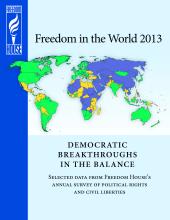Posts Tagged ‘Media Freedom’ (32 found)
Myanmar: Press Bill Falls Far Short of International Law and Would Leave Press Open to Abuse
Despite promises of reform, a new press bill to be presented in parliament retains a vagueness that will leave the print media open to abuse from the government and other powerful actors.
The draft Press Law Bill (2013) says that the media should become “a fourth pillar” of democracy “watching and guiding the other three”. The media will not however become a fourth pillar under this draft because it undermines their role and overly restricts their work […]
• • •Freedom in the World 2013: Burma
 In April 2012, opposition leader Aung San Suu Kyi and her National League for Democracy (NLD) swept parliamentary by-elections, having boycotted the main elections in 2010. The NLD’s inclusion in the political process was accompanied by the continued liberalization of the media, internet, and economy, and by the sporadic release of political prisoners. Burma’s relations with foreign democracies also improved during the year, with several significant visits by international leaders. Despite this progress, ethnic and sectarian violence flared in parts of the country, and armed conflicts between the government and some of the country’s ethnic minority militias remained unresolved […]
In April 2012, opposition leader Aung San Suu Kyi and her National League for Democracy (NLD) swept parliamentary by-elections, having boycotted the main elections in 2010. The NLD’s inclusion in the political process was accompanied by the continued liberalization of the media, internet, and economy, and by the sporadic release of political prisoners. Burma’s relations with foreign democracies also improved during the year, with several significant visits by international leaders. Despite this progress, ethnic and sectarian violence flared in parts of the country, and armed conflicts between the government and some of the country’s ethnic minority militias remained unresolved […]
Burmese Media Spring
This report examines the state of the changes carried out by the government and offers detailed recommendations designed to improve respect for freedom of information in Burma and ensure that the improvements are lasting […]
• • •Freedom House Encouraged by Nascent Press Freedom Reform in Burma
Freedom House welcomes the announcement by the Burmese Government that it has ended pre-publication censorship and views it as another positive step in opening up the space for free expression. However, the Press Scrutiny and Registration Board (PSRD) has not been dismantled and highly restrictive media restrictions still remain firmly in place […]
• • •Burma: Shifting Gears to Reforms?
The most significant prisoner amnesty ever in Burma saw hundreds of political prisoners released on 13 January 2012. Among them were high profile activists Min Ko Naing, Ko Ko Gyi, Ashin Gambira and many journalists. Starting in mid-2011, the new rulers of Burma […]
• • •10 Most Censored Countries
Shutting out international media and imposing dictatorial controls on domestic coverage, the Horn of Africa nation of Eritrea has emerged as the world’s most censored country, the Committee to Protect Journalists has found in its newly updated analysis of press restrictions around […]
• • •Many News Websites Unblocked, but 17 Journalists and Three Netizens Still Held
Reporters Without Borders has confirmed that access to a number of previously banned foreign news websites including Youtube, BBC, Reuters, The Bangkok Post, Straits Times, Radio Free Asia, Irrawaddy, Democratic Voice of Burma, and the Burmese version of Voice of America has been unblocked. Internet connections nonetheless continue to be very slow […]
• • •In Burma, transition neglects press freedom
Thein Sein’s new civilian government has promised reform, but Burma remains one of the most restricted nations in the world for the press. A CPJ investigation finds a regime that heavily censors news reports and regularly imprisons journalists […]
• • •Free the Democratic Voice of Burma’s Video Journalists
Despite pledges by Burma’s new government that it has begun the transition to civilian rule, 17 video journalists (VJs) for the Oslo-based exiled media organisation, the Democratic Voice of Burma (DVB), remain imprisoned. They are among nearly 2,100 political prisoners in Burma, a testament to the lingering hold of dictatorial rule on the country […]
• • •Week 35: 2010 Election Watch (2-8 November)
Developments
Widespread evidence of electoral fraud, irregularities, threats, harassment, and lack of independent monitoring characterized Election Day and the days leading up to it:
- In the days before the election, local SPDC officials, polling station officials, and Union Solidarity and Development (USDP) members throughout the country solicited advance and proxy votes, in the overwhelming majority of cases specifically for the USDP […]









 All posts
All posts